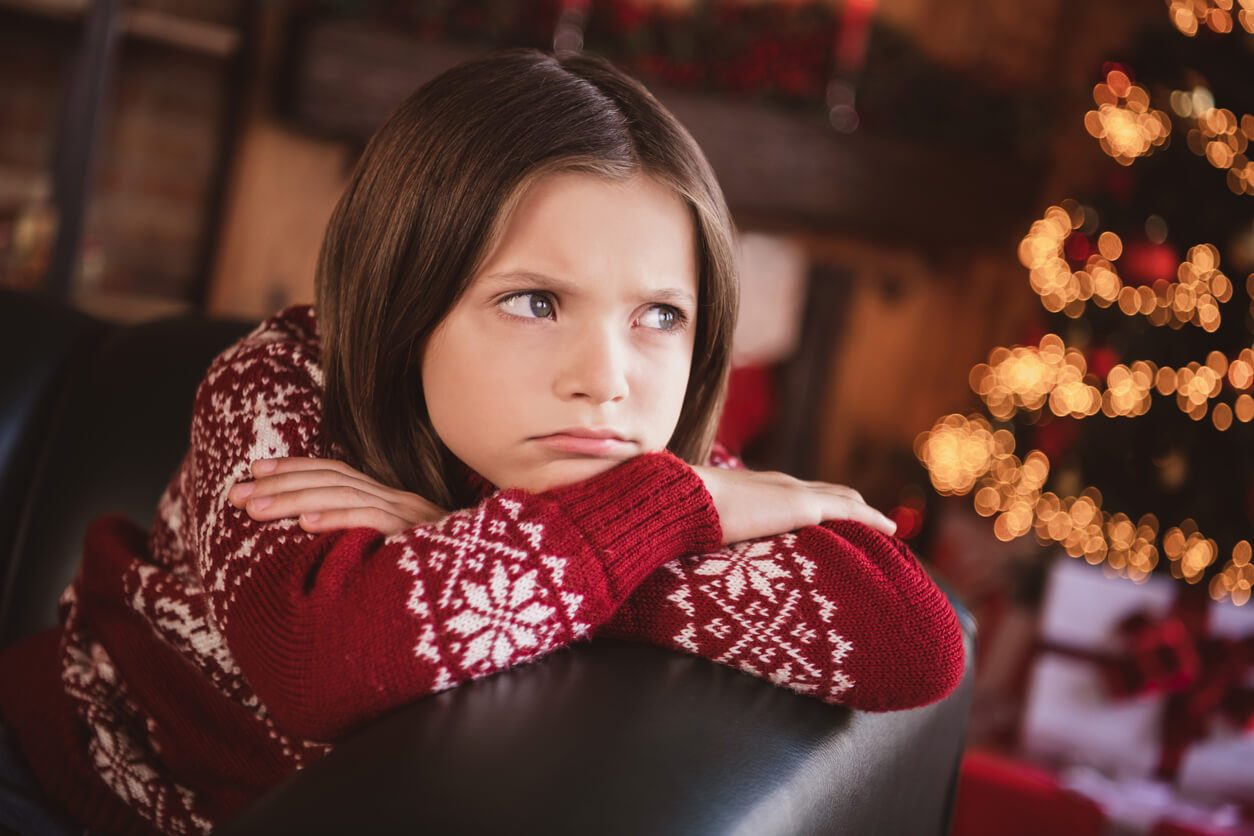How Changes in Routine During the Holidays Can Affect Your Child


Written and verified by the psychologist Maria Fátima Seppi Vinuales
All routines have certain advantages and are highly valued in the family’s day-to-day life. For example, they allow for planning and organization. They also provide a framework of security in knowing that things happen in a certain way. So, in general, we keep them throughout the year. However, there are times when they need to be broken and a little unstructured. With this in mind, keep reading to find out how changes in routine during the holidays can affect your child.
Find out how changes in routine during the holidays can affect your child
Christmas and other end-of-the-year holidays are an interruption in children’s school calendar and daily activities. They cause some changes in schedules, meals, and social events. And although many children look forward to this time with joy, it can also cause some stress or confusion in little ones.
For example, those who receive relatives or friends from other places often place the visitors in the children’s room, which means they lose their privacy for a few days and may have to sleep in another room with other siblings. This can affect their rest with alterations in their sleep and even their play, as they won’t have the same access to their toys.
Also, children perceive the stress of their parents due to the end-of-the-year farewells, the Christmas menu, shopping, travel, etc. In addition, they’re sometimes the target of anger that has nothing to do with them, as adults tend to lose their patience more easily than at other times of the year. Therefore, these school breaks tend to have effects that parents sometimes overlook.

How to approach changes in routine with your child
Here are some tips to keep the changes in routine from affecting your child too much.
Change the routine in a meaningful way
Christmas is a great time to share and spend time with your child. You can also organize family plans to get out of the house. In this regard, we suggest you ask your child what they would like to do and be part of the design of this family schedule. Promoting changes in routine that are meaningful is ideal.
Talk and anticipate
Routines allow us to understand what’s going to happen, plan, and anticipate. So, if you’ll be leaving home during the holidays or visitors will be coming to visit, it’s important to talk to your child and tell them about it ahead of time. This way, they’ll be able to process the situation and adapt.
Compensate for some changes in routine
For example, if the child never takes a nap because they go to bed early, you can promote a restful break in the afternoon so they can go to bed later that night. It’s not a good idea to make them go late into the evening without rest, as they’ll end up exhausted at night and in a bad mood, as it would any person. Therefore, a good nap will help them better enjoy evening festivities.
Regulate their diet
Although it’s time to be flexible, we shouldn’t ignore the fact that children need a certain balance, as they’re in a stage of growth and development. Therefore, you shouldn’t allow them to eat junk food or drink sugary beverages every day during their vacation. Some exceptions can be granted, but it’s important not to lose sight of the basic dietary guidelines.

Ask how they feel and observe their behavior
If your child is already able to verbalize their emotions, it’s important to ask how they feel about the changes and your family’s plans. Also, their behavior will be an indicator of how the child is coping. In some cases, if you notice that they’re very anxious, some relaxation techniques can be applied, such as deep breathing, to help them calm down and even help them fall asleep if they’re very active.
Respect each child’s timing
Holidays are special because they’re full of rituals and traditions that are repeated in families. In fact, many times, we get too fixed on carrying out each tradition to a tee that we forget about the real needs that our children have. For example, is a young child interested in staying up until midnight for the arrival of the New Year? Maybe some do, but others will miss their bed and prefer to sleep early.
It’s important that adults know how to recognize to what degree their decisions are based on their own desires and how much consideration they’ve given to their children’s needs and wishes. Perhaps, at some point, they’ll be interested in participating more in these meaningful traditions, but forcing them or even getting angry with them because they prefer to go to sleep or do less socializing will only rob them of enjoying the true spirit of Christmas.
All routines have certain advantages and are highly valued in the family’s day-to-day life. For example, they allow for planning and organization. They also provide a framework of security in knowing that things happen in a certain way. So, in general, we keep them throughout the year. However, there are times when they need to be broken and a little unstructured. With this in mind, keep reading to find out how changes in routine during the holidays can affect your child.
Find out how changes in routine during the holidays can affect your child
Christmas and other end-of-the-year holidays are an interruption in children’s school calendar and daily activities. They cause some changes in schedules, meals, and social events. And although many children look forward to this time with joy, it can also cause some stress or confusion in little ones.
For example, those who receive relatives or friends from other places often place the visitors in the children’s room, which means they lose their privacy for a few days and may have to sleep in another room with other siblings. This can affect their rest with alterations in their sleep and even their play, as they won’t have the same access to their toys.
Also, children perceive the stress of their parents due to the end-of-the-year farewells, the Christmas menu, shopping, travel, etc. In addition, they’re sometimes the target of anger that has nothing to do with them, as adults tend to lose their patience more easily than at other times of the year. Therefore, these school breaks tend to have effects that parents sometimes overlook.

How to approach changes in routine with your child
Here are some tips to keep the changes in routine from affecting your child too much.
Change the routine in a meaningful way
Christmas is a great time to share and spend time with your child. You can also organize family plans to get out of the house. In this regard, we suggest you ask your child what they would like to do and be part of the design of this family schedule. Promoting changes in routine that are meaningful is ideal.
Talk and anticipate
Routines allow us to understand what’s going to happen, plan, and anticipate. So, if you’ll be leaving home during the holidays or visitors will be coming to visit, it’s important to talk to your child and tell them about it ahead of time. This way, they’ll be able to process the situation and adapt.
Compensate for some changes in routine
For example, if the child never takes a nap because they go to bed early, you can promote a restful break in the afternoon so they can go to bed later that night. It’s not a good idea to make them go late into the evening without rest, as they’ll end up exhausted at night and in a bad mood, as it would any person. Therefore, a good nap will help them better enjoy evening festivities.
Regulate their diet
Although it’s time to be flexible, we shouldn’t ignore the fact that children need a certain balance, as they’re in a stage of growth and development. Therefore, you shouldn’t allow them to eat junk food or drink sugary beverages every day during their vacation. Some exceptions can be granted, but it’s important not to lose sight of the basic dietary guidelines.

Ask how they feel and observe their behavior
If your child is already able to verbalize their emotions, it’s important to ask how they feel about the changes and your family’s plans. Also, their behavior will be an indicator of how the child is coping. In some cases, if you notice that they’re very anxious, some relaxation techniques can be applied, such as deep breathing, to help them calm down and even help them fall asleep if they’re very active.
Respect each child’s timing
Holidays are special because they’re full of rituals and traditions that are repeated in families. In fact, many times, we get too fixed on carrying out each tradition to a tee that we forget about the real needs that our children have. For example, is a young child interested in staying up until midnight for the arrival of the New Year? Maybe some do, but others will miss their bed and prefer to sleep early.
It’s important that adults know how to recognize to what degree their decisions are based on their own desires and how much consideration they’ve given to their children’s needs and wishes. Perhaps, at some point, they’ll be interested in participating more in these meaningful traditions, but forcing them or even getting angry with them because they prefer to go to sleep or do less socializing will only rob them of enjoying the true spirit of Christmas.
All cited sources were thoroughly reviewed by our team to ensure their quality, reliability, currency, and validity. The bibliography of this article was considered reliable and of academic or scientific accuracy.
- Prado Borja, C. (2014). La importancia de las rutinas en niños de educación inicial de 3 a 5 años (Bachelor’s thesis, Quito, 2014).
- Migliorini, L., Cardinali, P., & Rania, N. (2011). La cotidianidad de lo familiar y las habilidades de los niños. Psicoperspectivas, 10(2), 183-201.
- Migliorini, Laura, Cardinali, Paola, & Rania, Nadia. (2011). La Cotidianidad de lo Familiar y las Habilidades de los Niños. Psicoperspectivas, 10(2), 183-201. https://dx.doi.org/10.5027/psicoperspectivas-Vol10-Issue2-fulltext-165
This text is provided for informational purposes only and does not replace consultation with a professional. If in doubt, consult your specialist.








